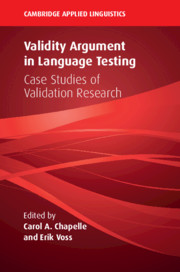Book contents
- Validity Argument in Language Testing
- The Cambridge Applied Linguistics Series
- Validity Argument in Language Testing
- Copyright page
- Contents
- Figures
- Tables
- Contributors
- Series Editor’s Preface
- 1 Introduction to Validity Argument in Language Testing and Assessment
- Part I Basic Concepts and Uses of Validity Argument in Language Testing and Assessment
- Part II Investigating Score Interpretations
- 4 Domain Definition Inference for a Virtual Interactive Aviation English Test (VIAET) for Military Air Traffic Controllers
- 5 Support for the Evaluation Inference
- 6 Generalization Inference for a Computer-Mediated Graphic-Prompt Writing Test for ESL Placement
- 7 The Telephone Standard Speaking Test
- 8 The Explanation Inference for a Test of Academic English Collocational Ability
- 9 Extrapolation of the Meaning of Grades on Writing Tasks in an ESL Writing Class to Success on Tasks in University Courses
- Part III Investigating Score Uses and Consequences
- Part IV Conclusion
- Index
- References
9 - Extrapolation of the Meaning of Grades on Writing Tasks in an ESL Writing Class to Success on Tasks in University Courses
from Part II - Investigating Score Interpretations
Published online by Cambridge University Press: 14 January 2021
- Validity Argument in Language Testing
- The Cambridge Applied Linguistics Series
- Validity Argument in Language Testing
- Copyright page
- Contents
- Figures
- Tables
- Contributors
- Series Editor’s Preface
- 1 Introduction to Validity Argument in Language Testing and Assessment
- Part I Basic Concepts and Uses of Validity Argument in Language Testing and Assessment
- Part II Investigating Score Interpretations
- 4 Domain Definition Inference for a Virtual Interactive Aviation English Test (VIAET) for Military Air Traffic Controllers
- 5 Support for the Evaluation Inference
- 6 Generalization Inference for a Computer-Mediated Graphic-Prompt Writing Test for ESL Placement
- 7 The Telephone Standard Speaking Test
- 8 The Explanation Inference for a Test of Academic English Collocational Ability
- 9 Extrapolation of the Meaning of Grades on Writing Tasks in an ESL Writing Class to Success on Tasks in University Courses
- Part III Investigating Score Uses and Consequences
- Part IV Conclusion
- Index
- References
Summary
The goal of ESL courses offered in American universities is to prepare international students for communication in other courses. This chapter investigates the degree of correspondence in the writing tasks used for assessment in an ESL course and those in other courses. The argument-based validity study focused on extrapolation, the degree of correspondence between performance on the assessment tasks and performance in the context of interest to scores users. Accordingly, this study compared course syllabi, assignment sheets, and students’ written assignments as well as analyzing instructor interview data and student survey responses. The results suggest that the ESL writing and disciplinary course assignments differ with regard to genre, topic, information sources, purpose, rhetorical functions, and length despite their similarity of target audience. In addition, interview data show that students tended to notice more differences than similarities in assignments in the ESL and other courses. The findings do not support the extrapolation inference in the interpretation/use argument for the assessed writing in the ESL courses. Instead, findings point to suggestions for revision to these writing assignments in the ESL academic writing course.
Keywords
- Type
- Chapter
- Information
- Validity Argument in Language TestingCase Studies of Validation Research, pp. 204 - 232Publisher: Cambridge University PressPrint publication year: 2021



